Impact of Ineffective Corporate Governance on Competition and Success: A Case Study on Unilever UK
Added on 2023-06-14
31 Pages9156 Words237 Views
REPORT
(To determine the impact of strategic issues of
ineffective corporate governance on the competition
level and success of an organisation. A case study on
Unilever UK)
(To determine the impact of strategic issues of
ineffective corporate governance on the competition
level and success of an organisation. A case study on
Unilever UK)
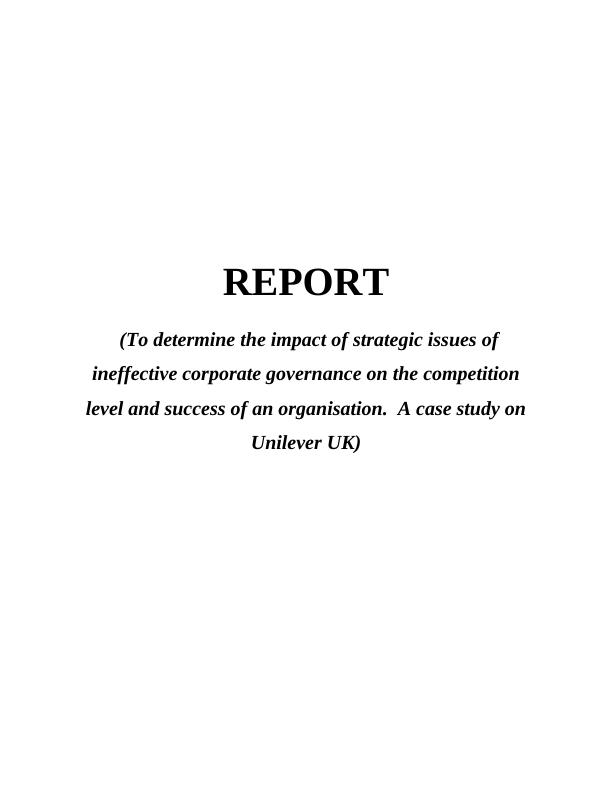
Table of Contents
INTRODUCTION...........................................................................................................................3
Background of the research.........................................................................................................3
Background of the organisation..................................................................................................3
Problem statement.......................................................................................................................3
Research aim and objectives.......................................................................................................4
LITERATURE REVIEW ...............................................................................................................5
What is the importance of corporate governance and strategy on the success of a firm?...........5
What is the impact of ineffective corporate governance in leading the issues of rising input
cost?.............................................................................................................................................7
What is the influence of strategic issues of ineffective corporate governance on the
competition level and success of a firm?....................................................................................9
What are the relevant strategies in order to beat the competition?...........................................11
RESEARCH METHODOLOGY...................................................................................................13
CRITICAL REVIEW OF RESULTS ...........................................................................................16
Frequency distribution table......................................................................................................16
Data interpretation.....................................................................................................................17
RECOMMENDATION AND ACTION PLAN............................................................................24
Conclusion.................................................................................................................................24
Recommendation.......................................................................................................................24
Action plan................................................................................................................................25
REFERENCES .............................................................................................................................28
APPENDIX ...................................................................................................................................30
Questionnaire............................................................................................................................30
INTRODUCTION...........................................................................................................................3
Background of the research.........................................................................................................3
Background of the organisation..................................................................................................3
Problem statement.......................................................................................................................3
Research aim and objectives.......................................................................................................4
LITERATURE REVIEW ...............................................................................................................5
What is the importance of corporate governance and strategy on the success of a firm?...........5
What is the impact of ineffective corporate governance in leading the issues of rising input
cost?.............................................................................................................................................7
What is the influence of strategic issues of ineffective corporate governance on the
competition level and success of a firm?....................................................................................9
What are the relevant strategies in order to beat the competition?...........................................11
RESEARCH METHODOLOGY...................................................................................................13
CRITICAL REVIEW OF RESULTS ...........................................................................................16
Frequency distribution table......................................................................................................16
Data interpretation.....................................................................................................................17
RECOMMENDATION AND ACTION PLAN............................................................................24
Conclusion.................................................................................................................................24
Recommendation.......................................................................................................................24
Action plan................................................................................................................................25
REFERENCES .............................................................................................................................28
APPENDIX ...................................................................................................................................30
Questionnaire............................................................................................................................30
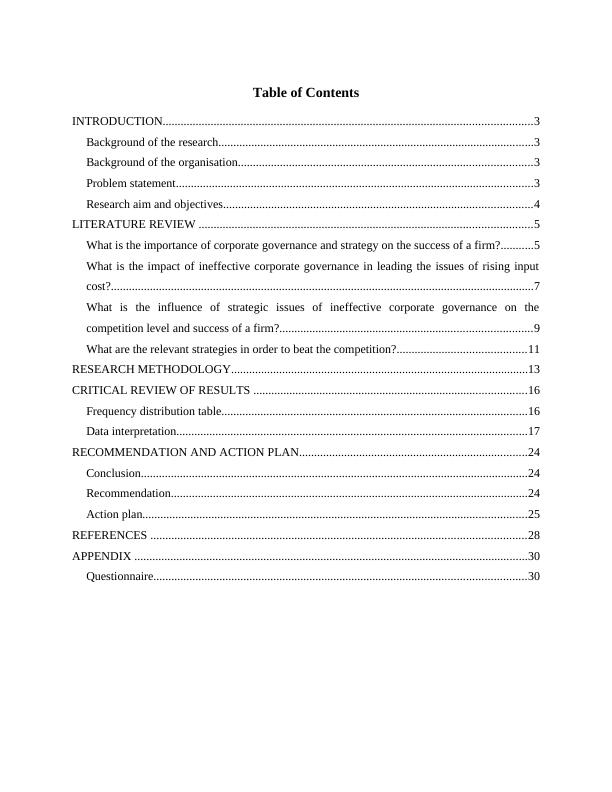
INTRODUCTION
Background of the research
Corporate governance is defined as the system which is used within the organisation in
order to provide direction to the organisation and to control different activities of the business
(Aguilera and Crespi-Cladera, 2016). Corporate governance are such rules and policies which are
used within the organisation for the major purpose of managing the business and to put corporate
behaviour for the organisation (Solomon, 2020). For an organisation corporate governance is
important as this leads the investors to manage organisational integrity and increase
shareholder’s diligence as well. There are various strategic issues that could be faced by the
organisation due to having ineffective corporate governance such as loosing of investor's trust,
financial issues and many other. The current report is going to develop understanding in the
context of role of corporate governance over succession of the organisation.
Background of the organisation
Unilever is a British multinational consumer goods company which is headquartered in
London, United Kingdom. The products of Unilever include food, beverages, cleaning agents,
personal care products and many others. The Unilever has 44 brand in their portfolio in which 14
categories are served by the organisation (Fenwick, McCahery and Vermeulen, 2019). The
company is managing 18000 employees has recently acquired consumer healthcare organisation
(Laursen and Andersen, 2016). The organisation is market leader in different markets such as
India which means that the organisation is having global market identity and the company is
putting various efforts in order to develop their market edge.
Problem statement
The corporate governance is defined as using of different set of principles and policies in
the organisation so that in multi-dimensional manner business can be managed (Cancela and et.
al., 2020). With the help of corporate governance practices this is easier to align business
practices in such a manner that interest of stakeholders can be managed. When ineffective
corporate governance is existed within the organisation then risks can be increased within the
organisation and at the same time productivity would be hampered (Kovermann and Velte,
2019). The identified issue within the current research is related with ineffective corporate
Background of the research
Corporate governance is defined as the system which is used within the organisation in
order to provide direction to the organisation and to control different activities of the business
(Aguilera and Crespi-Cladera, 2016). Corporate governance are such rules and policies which are
used within the organisation for the major purpose of managing the business and to put corporate
behaviour for the organisation (Solomon, 2020). For an organisation corporate governance is
important as this leads the investors to manage organisational integrity and increase
shareholder’s diligence as well. There are various strategic issues that could be faced by the
organisation due to having ineffective corporate governance such as loosing of investor's trust,
financial issues and many other. The current report is going to develop understanding in the
context of role of corporate governance over succession of the organisation.
Background of the organisation
Unilever is a British multinational consumer goods company which is headquartered in
London, United Kingdom. The products of Unilever include food, beverages, cleaning agents,
personal care products and many others. The Unilever has 44 brand in their portfolio in which 14
categories are served by the organisation (Fenwick, McCahery and Vermeulen, 2019). The
company is managing 18000 employees has recently acquired consumer healthcare organisation
(Laursen and Andersen, 2016). The organisation is market leader in different markets such as
India which means that the organisation is having global market identity and the company is
putting various efforts in order to develop their market edge.
Problem statement
The corporate governance is defined as using of different set of principles and policies in
the organisation so that in multi-dimensional manner business can be managed (Cancela and et.
al., 2020). With the help of corporate governance practices this is easier to align business
practices in such a manner that interest of stakeholders can be managed. When ineffective
corporate governance is existed within the organisation then risks can be increased within the
organisation and at the same time productivity would be hampered (Kovermann and Velte,
2019). The identified issue within the current research is related with ineffective corporate
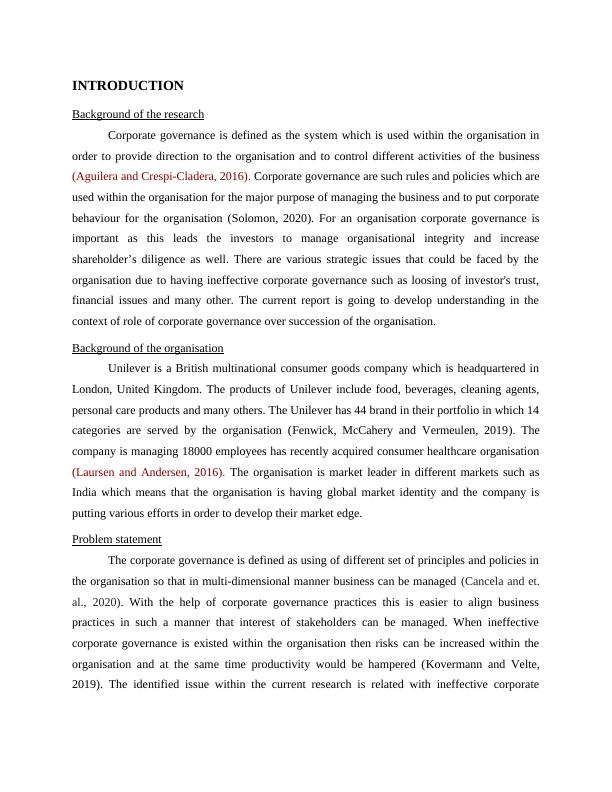
governance and significance of proper corporate governance which would be helpful in attaining
business objectives in proper time.
Research aim and objectives
Research aim
The main aim of current research is, “To determine the impact of strategic issues of
ineffective corporate governance on the competition level and success of an organisation. A case
study on Unilever UK.
Research objectives:
To analyse the importance of corporate governance and strategy on the success of a firm
To identify the impact of ineffective corporate governance in leading the issues of rising
input cost
To analysis the influence of strategic issues of ineffective corporate governance on the
competition level and success of a firm
To ascertain relevant strategies in order to beat the competition
Research questions
What is the importance of corporate governance and strategy on the success of a firm?
What is the impact of ineffective corporate governance in leading the issues of rising
input cost?
What is the influence of strategic issues of ineffective corporate governance on the
competition level and success of a firm?
What are the relevant strategies in order to beat the competition?
business objectives in proper time.
Research aim and objectives
Research aim
The main aim of current research is, “To determine the impact of strategic issues of
ineffective corporate governance on the competition level and success of an organisation. A case
study on Unilever UK.
Research objectives:
To analyse the importance of corporate governance and strategy on the success of a firm
To identify the impact of ineffective corporate governance in leading the issues of rising
input cost
To analysis the influence of strategic issues of ineffective corporate governance on the
competition level and success of a firm
To ascertain relevant strategies in order to beat the competition
Research questions
What is the importance of corporate governance and strategy on the success of a firm?
What is the impact of ineffective corporate governance in leading the issues of rising
input cost?
What is the influence of strategic issues of ineffective corporate governance on the
competition level and success of a firm?
What are the relevant strategies in order to beat the competition?
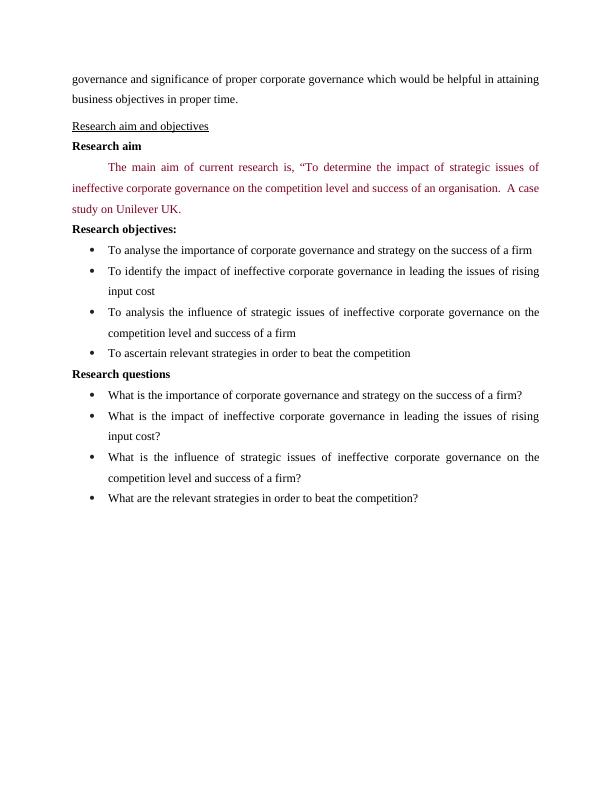
LITERATURE REVIEW
What is the importance of corporate governance and strategy on the success of a firm?
As per the viewpoint of Suhadak and et. al., (2018), corporate governance plays an
important role within business as it helps in providing brief information related to the laws and
rules which are followed by organisation. The concept of corporate governance is wide as it
includes various rules, laws and process which helps business to regulate, control and operate the
functioning and operation of company in effective and efficient manner. Corporate governance
is a process through which organisation avail direction and control over their business
performance. The responsibility of the governance is totally depending on board of directors.
The main role of shareholders in governance is to hire directors and auditors. Corporate
governance generally helps in building better environment, accountability and transparency in
order to foster long term investment. It includes the rules, laws and regulations by which
organisation can regulate, operate and control their business operation. The few elements of
corporate governance are director independence and performance, focus on diversity, regular
compensation review, auditor independence, shareholders right and proxy voting.
Importance of corporate governance:
There are various importance of corporate governance which can be availed by company
such as it helps in cultivating company's culture of integrity, brings sustainability and
also leads to positive performance. Corporate governance helps in attracting investors due
to which company can perform better and efficient manner. Investors generally get
attracted by the company when they have good corporate governance (Jain and Jamali,
2016). Thus, it is important to ensure that organisation must have efficient corporate
governance as it helps in protecting shareholders and stakeholders right.
In order to gain success in market, corporate governance is important for company as it
helps in improving the performance of business and also enhances the vital reasoning of
management by hiring independent director so that they can bring intellectual experience
to business without any biased factor.
The importance of corporate governance is to ensure that the business must be in
disciplined and also there must be healthy harmony between management and ownership
What is the importance of corporate governance and strategy on the success of a firm?
As per the viewpoint of Suhadak and et. al., (2018), corporate governance plays an
important role within business as it helps in providing brief information related to the laws and
rules which are followed by organisation. The concept of corporate governance is wide as it
includes various rules, laws and process which helps business to regulate, control and operate the
functioning and operation of company in effective and efficient manner. Corporate governance
is a process through which organisation avail direction and control over their business
performance. The responsibility of the governance is totally depending on board of directors.
The main role of shareholders in governance is to hire directors and auditors. Corporate
governance generally helps in building better environment, accountability and transparency in
order to foster long term investment. It includes the rules, laws and regulations by which
organisation can regulate, operate and control their business operation. The few elements of
corporate governance are director independence and performance, focus on diversity, regular
compensation review, auditor independence, shareholders right and proxy voting.
Importance of corporate governance:
There are various importance of corporate governance which can be availed by company
such as it helps in cultivating company's culture of integrity, brings sustainability and
also leads to positive performance. Corporate governance helps in attracting investors due
to which company can perform better and efficient manner. Investors generally get
attracted by the company when they have good corporate governance (Jain and Jamali,
2016). Thus, it is important to ensure that organisation must have efficient corporate
governance as it helps in protecting shareholders and stakeholders right.
In order to gain success in market, corporate governance is important for company as it
helps in improving the performance of business and also enhances the vital reasoning of
management by hiring independent director so that they can bring intellectual experience
to business without any biased factor.
The importance of corporate governance is to ensure that the business must be in
disciplined and also there must be healthy harmony between management and ownership
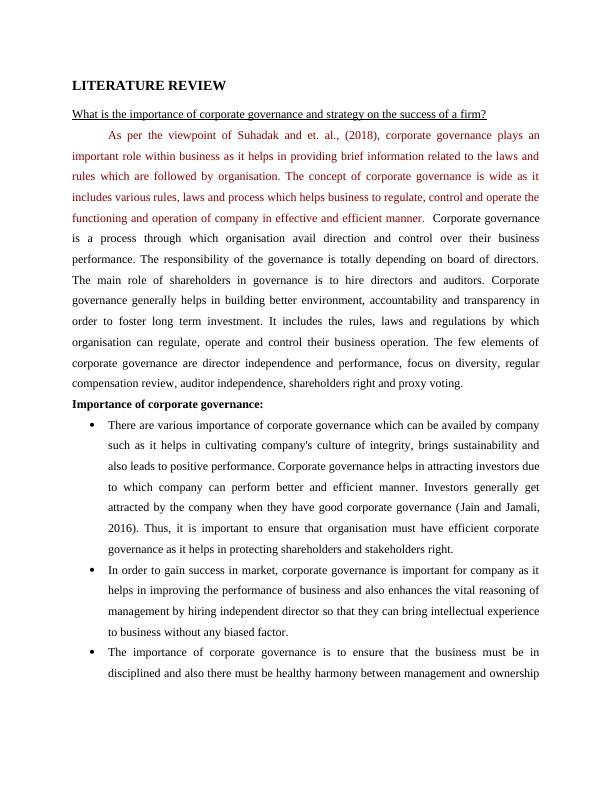
due to which management can make better decision by building trust among shareholders
and company.
As per the opinion of Jia, Huang and Man Zhang (2019), Strategy also plays an important
role in increasing the success rate of organisation. Corporate strategy helps in providing direction
on which company must move. Therefore, strategy helps in achieving the aims and objective of
the organisation in effective and efficient manner. The importance of corporate strategy in order
to gain success is that it helps in allocating resources of organisation, improves competitive
position, establishing business expectations and also increases the value of shareholders. It is
important for company to have clear and focused strategy so that they can gain success and make
better decision.
Advantages of corporate governance:
Advantage of corporate strategy is that it helps in providing larger company overview by
focusing on entire business rather than considering each busies unit. It also helps in
identifying the problem and prevent counterproductive measures. Through having
effective corporate governance, company can identify the existing or potential issues that
could influence the ability to accomplish the goals. Corporate strategy also helps in
preventing the implementation of other strategy which is counterproductive. It is mainly
categorised into different forms such as stability strategy, expansion strategy,
retrenchment strategy and combination strategy.
The other advantage of corporate governance is that it helps in allocating the resources of
organisation in significant manner due to which goals can be attained in better way
(Pfang, 2015). During the process of strategic planning and budgeting, firm generally
assess the performance of each business unit. From the above findings, organisation
acquires and divests their assets and revise resource allocation in appropriate manner.
Corporate strategy also helps in improving competitive position due to which the growth
and performance of company increases.
Theories of corporate governance:
The few theories of corporate governance are agency theory, stewardship theory,
stakeholder theory and transaction theory. These theories helps in describing the relationship
between various stakeholders while carrying out business activities in effective and efficient
manner (Naciti, 2019).
and company.
As per the opinion of Jia, Huang and Man Zhang (2019), Strategy also plays an important
role in increasing the success rate of organisation. Corporate strategy helps in providing direction
on which company must move. Therefore, strategy helps in achieving the aims and objective of
the organisation in effective and efficient manner. The importance of corporate strategy in order
to gain success is that it helps in allocating resources of organisation, improves competitive
position, establishing business expectations and also increases the value of shareholders. It is
important for company to have clear and focused strategy so that they can gain success and make
better decision.
Advantages of corporate governance:
Advantage of corporate strategy is that it helps in providing larger company overview by
focusing on entire business rather than considering each busies unit. It also helps in
identifying the problem and prevent counterproductive measures. Through having
effective corporate governance, company can identify the existing or potential issues that
could influence the ability to accomplish the goals. Corporate strategy also helps in
preventing the implementation of other strategy which is counterproductive. It is mainly
categorised into different forms such as stability strategy, expansion strategy,
retrenchment strategy and combination strategy.
The other advantage of corporate governance is that it helps in allocating the resources of
organisation in significant manner due to which goals can be attained in better way
(Pfang, 2015). During the process of strategic planning and budgeting, firm generally
assess the performance of each business unit. From the above findings, organisation
acquires and divests their assets and revise resource allocation in appropriate manner.
Corporate strategy also helps in improving competitive position due to which the growth
and performance of company increases.
Theories of corporate governance:
The few theories of corporate governance are agency theory, stewardship theory,
stakeholder theory and transaction theory. These theories helps in describing the relationship
between various stakeholders while carrying out business activities in effective and efficient
manner (Naciti, 2019).
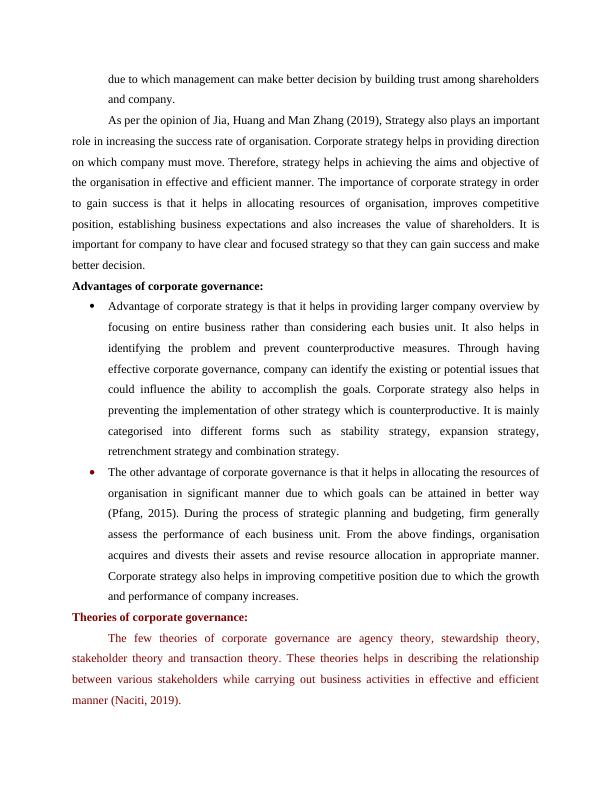
Agency theory
Agency theory is one of the corporate governance theory that describe the relationship
between the agents and principle (Krenn, 2016). The theory depicts that shareholders generally
hire directors to perform their job role within Unilever. Through this theory it is being analysed
that company act as an agent of its shareholders. The theory is used to explain and resolve
challenges in relationship between agents and business principles. The different agency theory
relationship which are involved within Unilever are shareholder and company executives,
investor and fund manager and board of directors and CEO. The benefits of implementing this
theory is that it offers executives incentive to take actions which helps in enhancing the wealth of
shareholder. It generally helps in providing clear parameters for board members and corporate
officers to make strategic decision. Throughout the relationship between agent and principle,
there are various action and decision which are taken by agent on behalf of the principle which
creates a problem such as conflict of interest, confidentiality breach, insider trading and many
others.
Stakeholder theory
Stakeholder theory is also a theory of corporate governance which states that manager of
Unilever must have strong relationship with different stakeholders in order to run the business
activity in effective and efficient manner. Stakeholder theory helps Unilever to maintain stability
in environment, reduce conflicts between various groups and conducive to the company's long
term sustainable development. The benefits of using stakeholder theory is that it helps in
increasing the productivity, improve mental health, reduce turnover rates and also satisfy the
employees. Through using this theory, Unilever can improve their performance and productivity
by engaging their stakeholders in business activities. The disadvantage of their theory is conflicts
between stakeholders while making decision which can influence the performance and efficiency
of business. Stakeholder theory is important for Unilever to implement as it helps in reducing the
conflict and also develop more sustainable environment.
What is the impact of ineffective corporate governance in leading the issues of rising input cost?
As per the opinion of Salvioni and Gennari (2019), ineffective corporate governance can
create a great impact on the performance of business which leads to rising issues of input cost. It
is important for organisation to focus on developing effective corporate governance structure as
it can influence the business growth and productivity. The other issues which Unilever can face
Agency theory is one of the corporate governance theory that describe the relationship
between the agents and principle (Krenn, 2016). The theory depicts that shareholders generally
hire directors to perform their job role within Unilever. Through this theory it is being analysed
that company act as an agent of its shareholders. The theory is used to explain and resolve
challenges in relationship between agents and business principles. The different agency theory
relationship which are involved within Unilever are shareholder and company executives,
investor and fund manager and board of directors and CEO. The benefits of implementing this
theory is that it offers executives incentive to take actions which helps in enhancing the wealth of
shareholder. It generally helps in providing clear parameters for board members and corporate
officers to make strategic decision. Throughout the relationship between agent and principle,
there are various action and decision which are taken by agent on behalf of the principle which
creates a problem such as conflict of interest, confidentiality breach, insider trading and many
others.
Stakeholder theory
Stakeholder theory is also a theory of corporate governance which states that manager of
Unilever must have strong relationship with different stakeholders in order to run the business
activity in effective and efficient manner. Stakeholder theory helps Unilever to maintain stability
in environment, reduce conflicts between various groups and conducive to the company's long
term sustainable development. The benefits of using stakeholder theory is that it helps in
increasing the productivity, improve mental health, reduce turnover rates and also satisfy the
employees. Through using this theory, Unilever can improve their performance and productivity
by engaging their stakeholders in business activities. The disadvantage of their theory is conflicts
between stakeholders while making decision which can influence the performance and efficiency
of business. Stakeholder theory is important for Unilever to implement as it helps in reducing the
conflict and also develop more sustainable environment.
What is the impact of ineffective corporate governance in leading the issues of rising input cost?
As per the opinion of Salvioni and Gennari (2019), ineffective corporate governance can
create a great impact on the performance of business which leads to rising issues of input cost. It
is important for organisation to focus on developing effective corporate governance structure as
it can influence the business growth and productivity. The other issues which Unilever can face
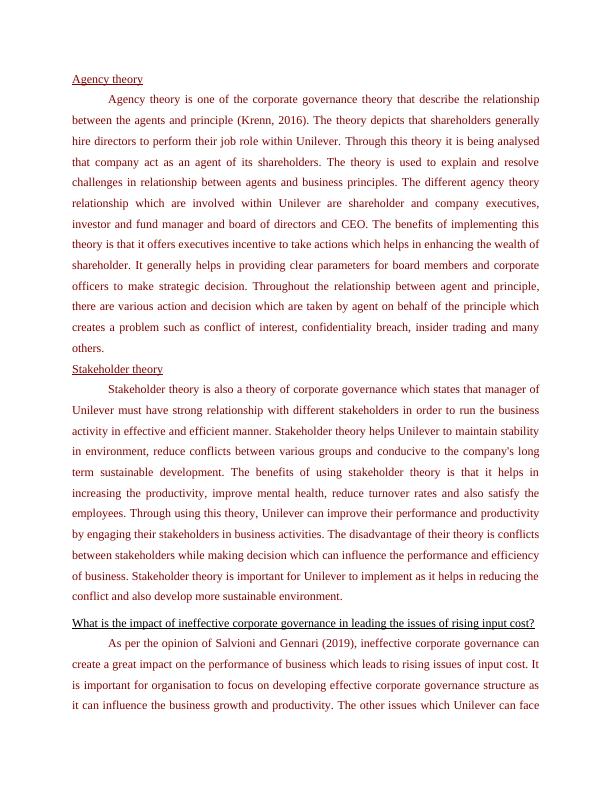
through ineffective corporate governance are lack of accountability, corruption, fraud and
negligence. There are various negative impact of ineffective corporate governance in leading the
issues of rising input cost. These challenges creates a great impact on the performance and
growth of business. The few issues which company face due to lack of corporate governance are
as follows:
Poor business decision:
Ineffective corporate governance creates a huge impact on organisation as it leads to
issues of rising input cost. When there is lack of effective corporate governance at management
and executive level it leads to poor business decision due to which the value and performance of
business gets influenced. The poor corporate governance can weaken the potential of company
and also brings financial difficulties. There is various reason due to which corporate governance
gets failed such as board of directors are not effective, complex process, poor communication,
improper culture, incapable of handling new technologies and economically unstable. These are
the few reasons due to which Unilever can face difficulty in managing the good corporate
governance within business.
Higher wastage of resources:
The ineffective corporate governance can bring higher cost of input which results in
higher wastage of resources. Rising cost is one of the major reason of ineffective corporate
governance which can affect the performance of Unilever. When there is increasing input cost it
leads to price rise due to which the competition also increases. Thus, it is one of the major
problem which arises into market. It is important for the Unilever to have effective and efficient
corporate governance as it can improve the profitability and sale of business by attracting
maximum number of people towards the brand.
Ineffective supplier policies:
Organisation must focus on offering high quality of products and services to its
customers at low price in order to increase the sale and profit margin of business. The rise of
input cost increases the producing cost. In order to generate more money, producers generally
sell their products at high cost. Thus, the increase in price input leads to decrease in supply. It is
necessary to focus on maintaining good and harmonious relationship with suppliers so that they
can provide the products and helps in meeting the demand of customers (Ciftci and et. al., 2019).
The ineffective corporate governance can bring various issues and challenges for organisation.
negligence. There are various negative impact of ineffective corporate governance in leading the
issues of rising input cost. These challenges creates a great impact on the performance and
growth of business. The few issues which company face due to lack of corporate governance are
as follows:
Poor business decision:
Ineffective corporate governance creates a huge impact on organisation as it leads to
issues of rising input cost. When there is lack of effective corporate governance at management
and executive level it leads to poor business decision due to which the value and performance of
business gets influenced. The poor corporate governance can weaken the potential of company
and also brings financial difficulties. There is various reason due to which corporate governance
gets failed such as board of directors are not effective, complex process, poor communication,
improper culture, incapable of handling new technologies and economically unstable. These are
the few reasons due to which Unilever can face difficulty in managing the good corporate
governance within business.
Higher wastage of resources:
The ineffective corporate governance can bring higher cost of input which results in
higher wastage of resources. Rising cost is one of the major reason of ineffective corporate
governance which can affect the performance of Unilever. When there is increasing input cost it
leads to price rise due to which the competition also increases. Thus, it is one of the major
problem which arises into market. It is important for the Unilever to have effective and efficient
corporate governance as it can improve the profitability and sale of business by attracting
maximum number of people towards the brand.
Ineffective supplier policies:
Organisation must focus on offering high quality of products and services to its
customers at low price in order to increase the sale and profit margin of business. The rise of
input cost increases the producing cost. In order to generate more money, producers generally
sell their products at high cost. Thus, the increase in price input leads to decrease in supply. It is
necessary to focus on maintaining good and harmonious relationship with suppliers so that they
can provide the products and helps in meeting the demand of customers (Ciftci and et. al., 2019).
The ineffective corporate governance can bring various issues and challenges for organisation.
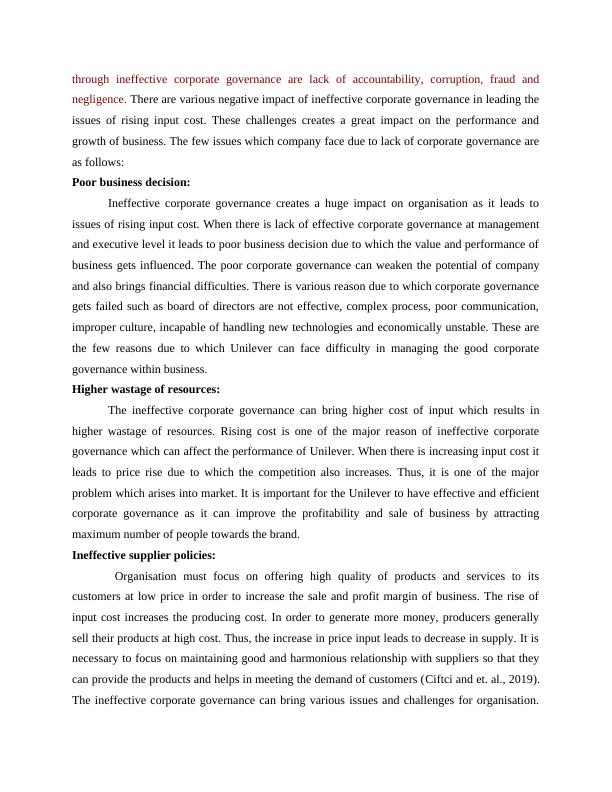
End of preview
Want to access all the pages? Upload your documents or become a member.
Related Documents
Importance of Transparency and Accountability in Sainsbury'slg...
|33
|10068
|232
Importance of Corporate Governance in Eliminating Customer Issueslg...
|31
|6506
|84
Role of Corporate Governance Practices and Strategies in Dealing with Decreasing Sales within Retail Industry: A Study on Marks & Spencerlg...
|26
|7422
|257
Feasibility Test of Business Projects of Petronas in Oil and Gas Sector in Malaysialg...
|63
|18207
|155
Corporate Strategy and Governancelg...
|37
|8676
|79
Business Strategy for Unilever Plclg...
|14
|4523
|351
